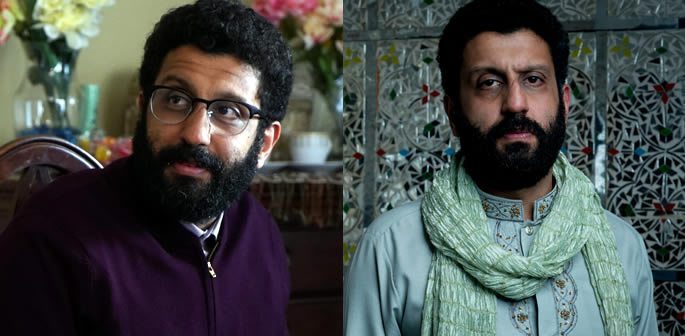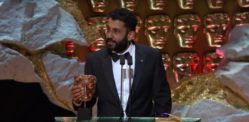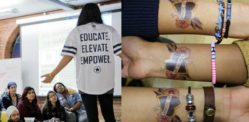"There’s lots of work to be done but I’m really encouraged at where we’re at.”
Representation in media has been an on-going concern for many ethnic actors over the years. And award-winning actor Adeel Akhtar is no exception.
The Brit-Asian’s latest role sees him in Kumail Nanjiani’s unconventional romantic comedy, The Big Sick. It follows on from his historic BAFTA win for BBC 3’s Murdered by My Father.
Akhtar is the first non-white actor to receive a BAFTA TV award for Best Actor. Although his role in Utopia previously won him a nomination for Best Support Actor by BAFTA and The Royal Television Society, Adeel is one of the few Asian actors in the UK to gain recognition for his work. This is despite so many young and fresh talents emerging onto the scene.
Adeel Akhtar began working as an actor in 2006 after training at the Actors Studio Drama School in New York. In a special interview with DESIblitz, Adeel admits that his decision to become an actor was a difficult one to make:
“I didn’t see anyone that looked like me or reflected back at me in the way that I wanted […] So, for a long time it was really hard for lots of people, like black, Asian and ethnic minorities.”
Early British Asian Media Representation
Clearly a lack of British Asian representation in film and TV can discourage any aspiring actor trying to make it in the acting world. But the issues are not just limited to roles, but also ethnic programming.
On TV, the first Asian-inspired programme was BBC’s In Logon Se Miliye, which aired on 10th October 1965.
Following this, both radio and TV addressed the changing needs of British Asians for the late 80s and 90s until the closure of the Asian Programmes Unit in 2008. As a result, viewers lost an essential aid to guaranteeing sufficient British Asian media representation.
While growing up in the later part of this period, Adeel Akhtar comments:
“Occasionally you’ve got some really good stuff on TV, talking about the Asian experience and being a British Asian [but] that was few and far between.”
One example is the staple of modern British Asian culture, Goodness Gracious Me. It rose awareness of concerns in the British Asian community and still is a cultural touchstone. Most importantly, it stands out even from today’s programming by showing the diversity of British Asians.
British Asian Representation in Film & TV Today
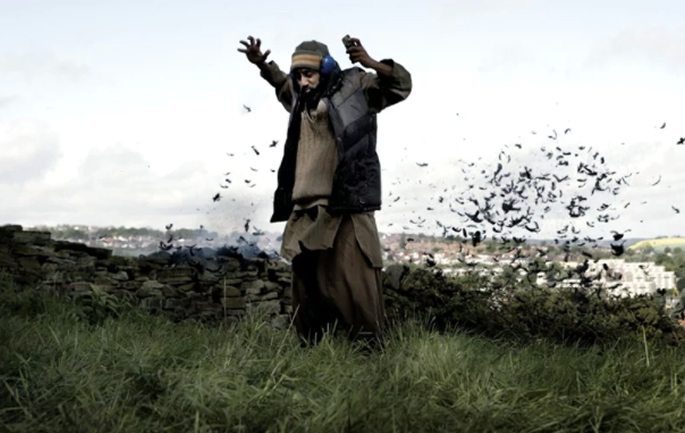
Adeel Akhtar’s Four Lions character Faisal may be brainless, but he is ultimately endearing. As a black comedy, the mishaps of his group of wannabe extremists reveals some darker truths.
While Goodness Gracious Me looks at assimilation for first generation immigrants, Four Lions speaks to their still marginalised children.
The loss of initiatives like the BBC Asian unit or BBC’s Gender and BAME pay gap represent significant issues behind the scenes. However, there are problems onscreen that affect today’s British Asian representation.
Meera Syal of Goodness Gracious Me worries about dramas like BBC’s Three Girls. While wanting to acknowledge problems like the Rochdale abuse scandal, the writer and actress stresses the problem of limited British Asian media representation.
After all, British Asian programming has been pushed from mainstream BBC channels to the exclusively online BBC 3.
Murdered by My Father
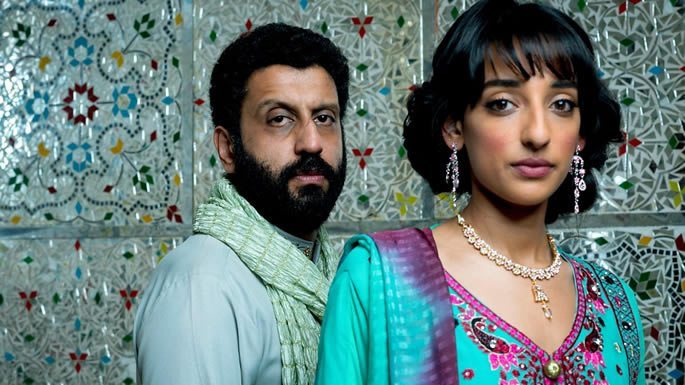
BBC 3 has done well to address some of the British Asian experience, for instance its issue of honour killings. In fact, Adeel Akhtar’s award winning performance in Murdered by My Father opens a crucial dialogue on this problem.
It depicts the seriousness of honour-based killing in a very sensitive and realistic way. Shahzad is a loving and hardworking father and widower who kills his daughter under pressures from the community. When discussing his portrayal of this multidimensional character, Adeel Akhtar explains his process to us as:
“Almost approaching it with choreographing the beats that you have to hit, the emotional beats.
“You look at a script and you see that there has to be a point at which you have your first sort of angry outburst. Then you have the real outburst right at the end, the horrific act of me suffocating my daughter. Then at the very start, you have some real genuine loving interaction between me and my daughter.
“You just mark out the beats that you have to hit and then you just take it beat by beat really – you approach it almost like a choreographed dance. You just go: I know I’ve got to get to that point, but what would make sense for me to get to that point?
“As opposed to feeling every feeling that you should in that story because it would be too tiring and it would make you go a little bit crazy I think.”
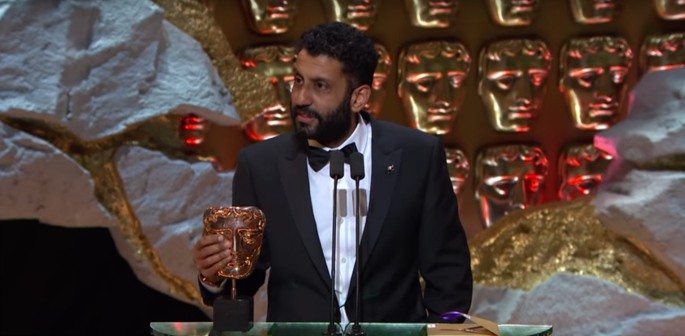
This is obvious in the show as it depicts a compelling and heart-breaking story for all audiences. However, this does not prove equal British Asian media representation, in spite of the show’s success. As Adeel Akhtar emphasises, the lack of British Asian media representation darkens the privilege of winning a BAFTA TV award:
“It sort of renders me a bit silent to think that has happened, that there hasn’t been anyone of colour in sixty five odd years to receive a BAFTA. But I’m really keen to use it and I try to think of all the reasons why I got into acting and why I do the things that I do.”
“The fact that I was the first Asian to win a BAFTA is an amazing feeling but with it, I’d like to work through that to a point where it doesn’t become an issue really, it becomes that someone sees me just as an actor.”
The programme addresses the important topic of honour killings with nuance. Nevertheless, Murdered by My Father could add concerns like Meera Syal’s. Its topic continues typical confining narratives for British Asian actors, so perhaps still defining them by their ethnicity.
Yet when discussing future roles, Adeel Akhtar prioritises the story:
“I would like to take on the type of role where I think that I could do the story as a whole, justice and a story that I feel is worth telling. That can come in any form, in a short film, a feature film, a bit of theatre, comedy, drama, anything, a web series. Just something worth telling and I feel like I can do it justice.”
The Big Sick
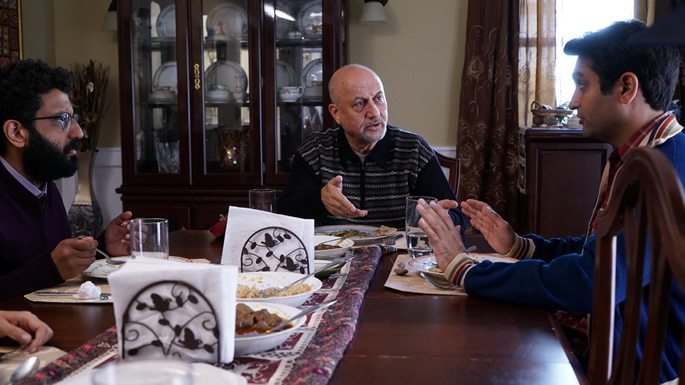
The Big Sick succeeds in offering this to its cast. Most clearly, it breaks with the conventions of romantic comedies with Kumail Nanjiani as the romantic lead. Adeel Akhtar’s role as Nanjiani’s brother, Naveed, achieves this more subtly.
Clad in his all-American Chicago Cubs jersey, Adeel Akhtar entertains audiences by bickering with Nanjiani’s over their cultural values. But rather than fully siding with Nanjiani’s parents, he offers his experience and demonstrates the brother’s bond with his support.
Watch the trailer for The Big Sick here:

But Akhtar and Nanjiani aren’t alone in winning more complex roles. Adeel Akhtar expresses his excitement over the success of Riz Ahmed, Dev Patel and Aziz Ansari, before adding:
“If we’d talked three years ago, even four years ago, that would have been a crazy conversation to have with each other about an Oscar nomination, a BAFTA win on my part, and mainstream comedy. There’s lots of work to be done but I’m really encouraged at where we’re at.”
Following these comments, the announcement of the Emmy nominations promisingly included Riz Ahmed and Aziz Ansari. But perhaps we are confusing our easy access to increasingly diverse American media for improvement on our screens. The triumph of British Asian actors in America highlights the lack of opportunity in the UK.
British Asian Actors in the US
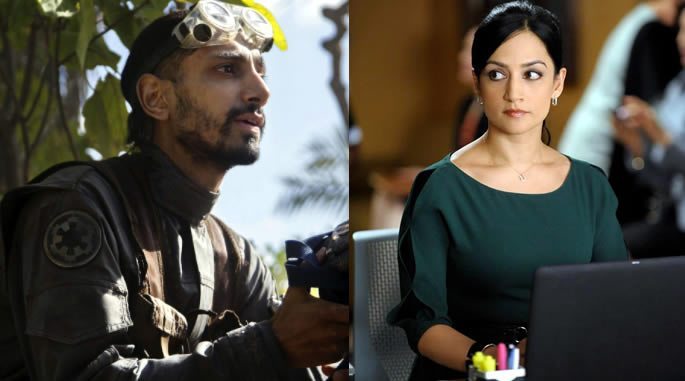
Adeel Akhtar’s own costar from Four Lions, Riz Ahmed, has found better recognition in the US. He has gained a variety of roles with the thriller Nightcrawler, the crime drama The Night Of, the action flick Jason Bourne and the sci-fi/fantasy Star Wars prequel, Rogue One: A Star Wars Story. More importantly, these roles did not focus on ethnicity.
Instead they echo principles important to Akhtar. When considering the performances that made him want to become an actor in the first place, he remarks:
“I think that when I look at a good performance, whoever it is, whatever colour the person is, whatever ethnicity they are, sexual orientation they are, you’re just overcome by how, when someone’s really good at what they do, they make you forget those things because they are expressing a truth behind their performance.”
Adeel Akhtar has improved British Asian representation with memorable characters in Four Lions or BBC’s The Night Manager. However, his career could still show this inequality between the US and the UK.
His big budget flicks appearances on The Dictator or the upcoming Victoria and Abdul have been British American collaborations. Then in BBC’s Capital, he plays Ahmed, a corner shop owner with a loved one suspected of terrorism links. In comparison, he plays Pan’s Smee overseas and will appear in the US supernatural sitcom, Ghosted.
On the other hand, British born actor Dev Patel maybe avoids this trap. Early roles in Skins and Slumdog Millionaire have led him worldwide with Australia’s Lion or American political drama, The Newsroom. Yet Patel continues to work on British productions like The Best Marigold Hotel and The Man Who Knew Infinity. But again, these characters are explicitly Indian and represent the ‘other’ or the exotic.
We shouldn’t forget our British actresses either. Archie Panjabi became a familiar name with the iconic films of Bend It Like Beckham and East is East. Now, her groundbreaking role as Kalinda Sharma in The Good Wife has won over American audiences and award shows.
Here she has not only improved British Asian media representation for the show’s global audience, but for the LGBT community. Her character is unique as a multidimensional female character and avoids common stereotypes of bisexuality.
The Future of British Asian Representation
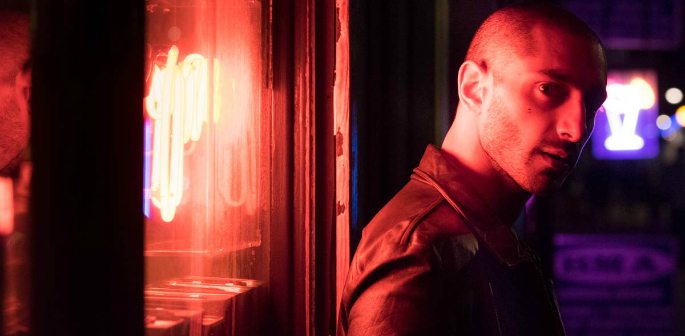
The representation of Asian actors in the US is far from perfect of course. Yet the proven bankability of British Asian stars may improve diversity on our British channels.
Already, films like Riz Ahmed’s City of Tiny Lights could mark the beginning of this change. Ahmed returns to London for a modern day noir that reflects the multicultural city. While it deals with fundamentalism, it also tackles themes of commerce, corruption and above all, emotional connections.
Similarly, Adeel Akhtar will appear in the upcoming British comedy, Swimming with Men, about an all-male, middle-aged amateur swimming team. From early looks, perhaps we can share Akhtar’s optimism about the future of British Asian media representation:
“I think we’ve come a long way and done really well to have achieved all the stuff that we’ve achieved. I feel very excited about the future in that respect, but there’s a lot of work that we still need to do.”
Over the last few years we have seen the increased visibility of brilliant British Asian talent. Finally, great actors like Archie Panjabi, Riz Ahmed, Dev Patel and Adeel Akhtar have found roles worthy of their skill.
The US may be enjoying their talents at the moment, but DESIblitz can’t wait to see how our UK screens change in response.
Adeel Akhtar’s latest film, The Big Sick, is in cinemas now.




















































